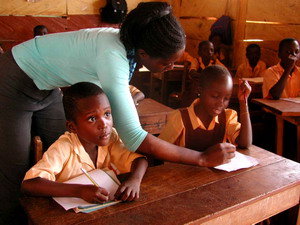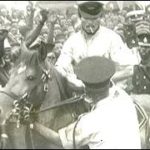It’s been more than two decades since one of Jerry Rawlings’ wet dreams culminated in the so-called educational reforms. Yet, there has never been a coherent and sensible explanation as to why the reforms were needed. All we have heard since 1987 is that the ‘new’ education system was meant to equip Ghanaians with vocational and technical skills, which would make everyone employable – if you don’t get a white collar job, at least, you could settle for a blue-collar one.
In other words, the system was “reformed” to give every Ghanaian child who gets the benefit of education the skills to bake and fry, knock wood together to make tables and chairs, mix cement into mortar and stitch together a pair of trousers. These were depicted in one of the silliest songs ever written…
Children of the land
Gather courage
JSS has come to save all
Only handle the tools with care
And the psychomotor skills shall flow
Children of the land
Gather courage
JSS has come to save all
- Advertisement -
Twenty years after Rawlings’ education reforms, John Kufuor realised that the so-called “psychomotor skills” were not flowing so he decided to tweak the system a wee bit. When Kufuor announced that he was going to review the reforms, I expected a radical overhaul of the educational system – build better schools, provide the learning tools, pay teachers well and build recreational facilities to give the kids the opportunity to explore and develop their talents.
As it turned out, I expected too much. After the review, the best Kufuor’s government could come up with was to change the name of the educational system replacing “secondary” in the nomenclature with “high”. Obviously not interested in engaging in any form of high thinking, the government also instructed that students at the senior high school level should spend four years in school – instead of three.
In essence, Rawlings (often maligned as the school dropout) wanted the kids to spend less time in school and Kufuor (who saw himself as learned) wanted them to be in school a little longer.
By some twist of electoral fate, Kufuor’s party has been kicked out of power and Rawlings’ is back in charge. Rawlings’ party does not understand why Kufuor wants Ghanaian kids to stay in school for longer than three years (some say it could affect their prospects for marriage) and they have made clear their intention to reform Kufuor’s educational review. Simply put, the reforms which were reviewed a couple of years ago are about to be reformed again. That irks Kufuor’s gang so much (for reasons that are also not very clear) and they insist that their reviews cannot be reformed to take us back to the reforms that were introduced in 1987.
None of this makes sense.
It’s been 22 years and we are still knocking our heads over the simple matter of how to best educate ourselves and our children. It took the Americans less time to put a man on the moon. If Hitler had been given the luxury of two decades he would have killed every Jew on the planet and completely exterminated the black race. Bill Gates didn’t need 22 years to build one of the most successful and impactful businesses in the world.
Twenty-two years is such a long time for a nation to waste talking and talking and talking about how to educate its populace. We have spent 22 years toying with the lives of children. If after 22 years of longwinded talk shops and seminars the system is no better than it was before the so-called reforms were introduced then would anyone be wrong to suggest that we live in a land where stupidity is an integral part of national policy?
I am a product of all of Rawlings’ so-called educational reforms. They promised so little and yet failed to deliver on even those little things. They swore that the reforms would help make “the psychomotor skills” flow and 22 years down the line we even don’t know what the heck those things are. Over the past 22 years we keep hearing about the “falling standards of education” in this country and it all because of this JSS/SSS nonsense.
If we would – for once – be honest with ourselves (at least for the sake of our children’s future), we would humbly concede that those reforms have completely failed. They were ill-conceived, ill-planned and ill-executed and they only succeeded in creating a daft educational system, which spews out too much academic junk.
To resolve the problem once and for all, I think we should simply go back to the system we had before Rawlings had that terrible ‘wet dream’ which made him decide to make Ghana a country of carpenters, masons and tailors.
When we had the O and A levels, if you were a smart kid you could take the Common Entrance Examinations and enter secondary school as early as 10 or 11 years. Others could choose to stay on until they finished Middle Form Four – averagely, by their 14th birthday. In the first couple of years in secondary, you got beaten and bullied a bit as you learnt the basics. By the third year, you should have cut your teeth and be ready to pick your favourite subjects. In the fifth year, you took your O-Levels. If you pass, you go to sixth form and if you fail you either try again or get a job – like Rawlings did. Usually by the age of 21 or 22, you would have finished secondary school and be ready to enter the university. You would spend just three years in the university and you would graduate by the age of 25 or 26. You would have graduated mature, having made most of your teenaged mistakes, ready to face life as an independent being.
Under the old system, textbooks were in abundance – it was an international system so even if you couldn’t get local authors, you could very much rely on books written by others in far-off lands. There was never any talk about incomplete syllabi or the non-availability of text books. And the system itself was flexible.
Then with a big bang, the new system came in. It works like a conveyor belt, producing a lot of junk. Whether you like it or not, you have to stay on in school at the basic level until the final year – learning theoretical carpentry and masonry. Under the old system, if your teacher identified you as a smart pupil, he could start preparing you for the Common Entrance which could take you to the secondary school before your tenth birthday. Not so with JSS. Here, pupils have no choice than to stay on until they are 14 or 15 before they get into senior secondary (or high) school.
In senior secondary school, they study for three years – mostly with half-baked syllabuses and insufficient textbooks and they are hurriedly passed out in three (or four years). Speak to any teacher or student and they will tell you about how they literally have to race through the syllabi within that short time frame to prepare for the final examinations. Under this new system, students learn by rote. They call it “chew, pour, pass and forget.”
When the first batch of senior secondary graduates passed out and were about to be admitted to the universities, the authorities realised that they were too hollow. They therefore instituted the “University Entrance Examinations” as a means of separating the wheat from the chaff. After passing the exams, those who were taken in were told that since they lacked the basics, they would be required to stay in the universities for four years – instead of three.
So, under the new system, a typical pupil will finish JSS by 15, get out of SSS by 18, enter the university by 20 and finish by 24, usually half-literate and that’s why we continue to hear about the “falling standards of education” in Ghana. It’s not a myth. It’s a reality.
There has been a maasive systems failure in our educational set-up. That’s why even the policy-makers send their kids abroad to be educated there. Others prefer that their kids attend international schools here in Ghana so that they will be spared the junk of the reforms. We must be thinking very fast about how to fix the problem – not organising useless forums to talk needlessly over whether people should stay ensnared in the failed system for three or four years. And for me, one of the best ways (if not the best way) to fix the problem is to scrap the damned reforms and go back to what we had before – at least for the simple reason that the current system is taking us nowhere.
The A-Levels were good. That system was in no hurry to kick students out and the longer they stayed in school, the more mature they got. The system had worldwide recognition. Textbooks and syllabi were available such that you could study on your own. The system wasn’t broken to begin with and so it needed no fixing. It was needlessly tampered with in a dangerous experiment. We cannot use the same trial-and-error methods to reverse the damage it has caused. The best way to get out of the mess is to return to what we had before. On this, I agree with what our ancestors say about “sankofa”.


